| From California And
Montana With Lots 'N Between. Continued
Ides Of
March
First came to
prominence when the Radio Luxembourg Talent tour reached
Wolverhampton and the tour manager, Stewart Collins, had
a conversation at the Connaught Hotel with the
mother of the group's drummer, Paul King. He
invited the group along and their sound impressed him
and Cyril Stapleton. The group included at varying
times, John Bradford as vocalist, Clive
Griffiths, John Beattie, Mick Reeves,
Eric Timmins and Lloyd Kirby. Their
manager was the vocalist's brother, Bob Bradford.
Within a month the group had gone down to London to
record, although they never released a record. John
Beattie later became a member of the Bossmen and
the German group Spectrum. The group remained
true to their blues roots of Elmore James and others.
They were very much an acquired taste, rather than a
typical pop group who attempted to woo the teenage
audience. They were originally called the Moments.
John Bradford was later to record under the names of
John Ford and Eli Bonaparte.
Immediate Pleasure
One group who
are seemingly only recalled by the writer but one
deserving of mention in this section. They did not
secure the sort of success they deserved but they were
an excellent group of musicians.
Intent 'n' Purpose
One of the few
local groups to play at the Cavern, although it was in
1966. They were managed by Dixie Dean. The group
included Derek Gibbs, Keith Tulley,
Steve Rideout, Phil Williams and Phil Bird.
They recorded for Les Reed and produced a single called
I Can't Take Any More. In 1968 the group became
Jason Cord & First Chapter with Derek Gibbs
becoming Jason Cord.
Jackpots
One of the most
enduring of local groups. They formed in 1958 and were
still performing at the end of the 60s. |
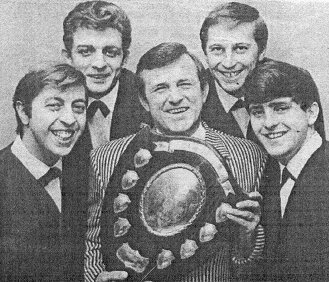
|
Jackpots.
One of the groups that seemed to go on
throughout in the 60s. Seen here with an
award as recognition of their continuing
popularity. |
|
The group which started off the
decade included Jeff James on vocals, Richie
Howe on drums, Pete Gibson
lead guitar, Tony Bradley on bass and Keith
Eddy on piano. They were one of the original groups
to play the Three Men In A Boat in Walsall.
By 1965 there had been some
changes to the group with
Eric Johns, Pete Hughes and Ronnie Bird
joining the group. They remained semi-professional
despite having a whole series of offers to sign a
professional contract.
By the end of the 1960s they were
still playing on the local scene, especially at the
Caves in Wren's Nest. |
|
Jaguars
A group which
came from T.P. Riley School in Walsall. They were made
up of Eric Thacker as lead, Dennis Shaw as
bass, Tony Hawkins on rhythm and vocals and
Keith Nolan on drums. Like many other Midland groups
they managed to get an appearance on Up And Doing.
They supported Sue Carr.
Jam Sandwich
The name that
was chosen by System when they returned from
Germany in 1968. It was in that guise that they returned
to Germany later in the same year. In 1969 they played
at the Star Club in Hamburg. By the end of 1969 it seems
that they grew tired of simply playing pop music and
sought a new sound and style. They became Aaron's Rod.
Jurymen
One of the
groups with whom John O'Hara sang. They became
the Shades Of Night. Like so many other local
groups it seems that a period in Germany led to a
proposed name change.
Just William
The name chosen
by Herbie's People in late 1968. They signed to
Spark records and released Cherrywood Green and
Birmingham Brass Band. The group included three
of the original members of Danny Cannon & Ramrods
in Dan Robinson, Len Beddow and Alan
Lacey. The other members were Brian Powney
and Pete Stevens.
Dave Lacey
(& Corvettes)
Although he did
not originate from Wolverhampton, he was one of the
first lead singers to establish himself in local
people's minds. His backing group was the Corvettes.
They were one of the groups to be managed by Ma Regan.
They were signed by both Decca and Phillips. They did
appear on Decca's Brum Beat LP with the
Mountain Kings and the Strangers. The group
included Dave as the vocalist with Winston Jones
on lead guitar, Roy Pinson on rhythm and John
Jauncey on bass. The drummer was Chris Hayes.
Their repertoire became increasingly C&W, rather like
Steve Brett.
Lady Jayne
(& Royaltee/Royalty)
One of the best
remembered of the local female vocalists. She headed
Lady Jayne & Royaltee (Royalty). The reason
for the spelling has never really been explained,
although it obviously helped with publicity, if only
because most people noticed it. Her real name was
Anna Terrana and she began with the group Our
Generation. |
| Her looks proved to be one of the
greatest assets of the group, although she had an
outstanding voice as well. The original group included
Phil Terrana, Geoff Hill, Roger
Constable and Fred Griffiths. In fact it was
Phil Terrana who sang on the A side of the group's CBS
recording of That Kind Of Girl.
On the record the group is called
Royalty. Phil Terrana was supposed to join Edison
Lighthouse but it never materialised. A later version of
the group included Paul Robbins, Mac Bailey
and
Pete Bickley, along with Anna. It was this group
which was going to become the original Fable.
Lady Jayne and Royaltee was regarded as the nearest
group the area had to the Mamas & Papas. |
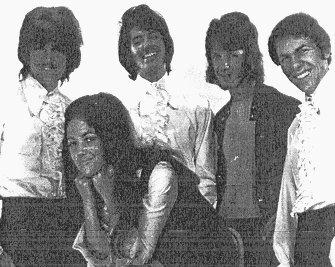
Lady Jayne &
Royaltee. Walking through
the grounds of Himley Hall for the cameras. They may
have sounded a little like the Mamas & Papas but Anna
Terrana certainly looked better than Mama Cass. (Anna
Terrana) |
|
Light Fantastic
One of the most
memorable of local groups because of their 'outrageous'
stage act. They were originally billed as Light
with Dripper Kent, although the main feature of
the act involved the group's bass player, Ron Dickson.
He would dress up as Dracula and put the fear of God
into almost everybody witnessing the act.
|
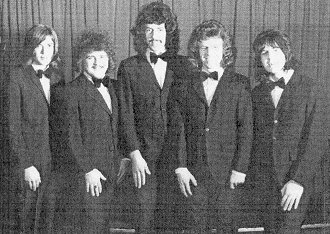
|
Light Fantastic.
You would never imagine that the gentleman
in the middle of the photograph, Ron
Dickson, was also Dracula. (Trevor Westwood) |
|
The other members of the group
were Richie Brown, an excellent lead guitarist,
Keith Locke and Tony Harrison.
The group appeared on RTE and had
the 'morality' of their act discussed by a panel of
'experts'. In 1969 Dripper Kent left the group and began
to work for the Astra Agency. Later in the year,
Richie Brown left.
The group continued to perform
with Ron Dickson becoming more and more the central
attraction of their cabaret act. |
|
Listen
One of Robert
Plant's earliest groups. He joined them from the
Crawling Kingsnakes. The rest of the group were
John Crutchley, Roger Beaver and Geoff
Thompson. The group was regarded as a Tamla Motown
-style band with something of a Mod image.
They released
one record You Better Run in 1966 at the same
time as the 'N Betweens also released the same
number. In 1967 the group broke up and Robert Plant
joined the Band Of Joy.
|

|
Listen. A very
intent and young Robert Plant seen here with
guitar. |
|
|
Love & Understanding
A vehicle for
the song-writing talents of Keith Law and
Martin Hall. They produced a number of very
personalised songs that had to be listened to and could
never be danced to. Schroeder Music signed them. They
had been with FP Enterprises from Willenhall.
Johnny Love
Another of the
longer-lasting performers from the period. His first
group was formed in March 1964 as Johnny Love &
Sceptres. The group included Harry Tonks,
Barry Fidler and Alan Clements.
|
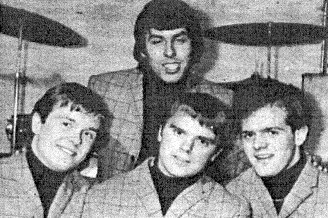
|
Love's Lot.
Just one of the many groups involving Johnny
Love. |
|
The group was managed by the
Walsall-based Terry Matthews. The group became
Love's Lot.
Johnny Love actually left the
group to concentrate on ballads in 1967. The separation
only lasted a few months before they re-united as the
Arrangement.
After another split the group
re-united again in 1969, thanks to the apparent
intervention of the floor manager from the
Lafayette club, Bill Sergeant. |
|
Marauders
One of the
earliest groups in the local area. Their origins lay in
Dudley. They were to become the Strangers. The
line-up included Roy Kent, Tony Dalloway,
John (Jake) Elcock, Norman Withers and
Mick Aston.
Martells
Name taken by
the Strangers for a relatively short time. The
group had Roy Kent, Alan Clee, Jake
Elcock, Tony Dalloway and Mick Aston.
When the group split, the first three mentioned became
part of Finders Keepers while the other two
became half of Two By Two.
Terry Martin
One of the
'original' modem jazz players in the town. He was
partially responsible for the founding of the town's
first modem jazz club at the Queen's (now
Edward's) in Cheapside. He played bass guitar
and was to continue to play as a member of the
London-based Chessmen, one of the main support
groups for many visiting artists (Rufus Thomas in 1964).
Another Wulfrunian member of the group was the drummer
Tony Brown. In 1968 he joined the Magicians
(they wore masks on
stage!) alongside another Wulfrunian, Dave Watkins
on piano.
Matchmakers
The group was
formed in 1964 with Ray Hopkins as vocalist,
Roy Tidmarsh on organ and three former members of
the Mavericks, Bob Lightwood, Gary
James and Rick Waldron. The group specialised
in Roy Orbison numbers because of Ray Hopkins' voice,
although he was probably at his best with bluesy
numbers. They supported Big Dee Irwin and Millie at the
Civic Hall in the summer of 1964. They were
definitely one of the more outstanding groups in the
area at the time. By the end of 1965 the group had split
up with Gary James joining Penthouse Suite and
Rick Waldron joining the Soul Seekers. The
break-up of the group was a great loss to the local
scene.
Matthew
Heralded as one
of the area's first 'super' groups. They emerged in 1969
with Geoff Parkes on lead, Pete Mackie on
bass (both from Revolver), Billy Bonham on
organ and Bob Elcock on drums. The group was
managed by Roger Allen. Their debut was at the
Connaught and they made a really great impression on
the audience (they stopped dancing to listen!). Their
version of Bang Bang was fantastic. Like so many
of the local groups they failed to achieve the success
which they deserved.
Medicine Head
A duo who came
through the local folk/blues scene made up of John
Fiddler and Peter Hope-Evans. They were
signed by John Peel's Dandelion label, releasing their
first single His Guiding Hand and first album
New Bottles, Old Medicine in 1969. They continued to
record into the early 70s. They charted with (And
The) Pictures In The Sky.
Memphis Cut-Outs
The group was a
product of T.P. Riley School in Bloxwich.
The original name was the Rockin' Phantoms with
Noddy Holder on lead and vocals, Phil Burnell
on rhythm, Mick Aulton on drums, Kenny Holland
on bass and a second vocalist named John 'Tubby'
Cooper. |
| Soon after, Ken Holland left and
Pete Bickley joined the group. In 1964 the group
joined
Steve Brett and became the 'new' Mavericks.
They were to stay with Steve for over a year. A later
drummer with the group was Gerry Kibble. It was
this version of the Mavericks who recorded with Steve
Brett.
When the group split up, Noddy
Holder joined the
'N Betweens who were to become Ambrose Slade
and then Slade. He was to become one of the most
successful performers of the 70s as the front man with
the most successful group of the Glam Rock period. Pete
Bickley joined an array of local groups including
Jenny Wren, Dual Purpose, Louisa Jane
White, Jason Cord and Fable. |
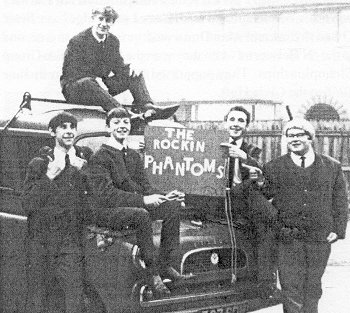
|
Rockin' Phantoms.
Seen here with the prerequisite for all
young groups, the van. Sitting on top can be
seen Noddy Holder. They are pictured
somewhere on the Beechdale Estate in
Walsall. (Pete Bickley) |
|
|
Montanas
Undoubtedly the
most popular local group of the 60s. They came together
in 1964 with Johnny Jones as vocalist, Bill
Hayward on lead guitar, Terry Rowley on bass
and Graham Crewe on drums. Bill had played with
the Crossfires and Connoisseurs. Terry had
played with the Mountain Kings and Scotti Wood.
The group was renown for their comedy sketches as well
as their superb renditions of contemporaneous American
harmony numbers. They were managed by Roger Allen.
They recorded on Piccadilly and Pye. Their best
remembered numbers were Ciao Baby and You've
Got To Be Loved, the latter made it into the lower
half of the American Hot 100. |
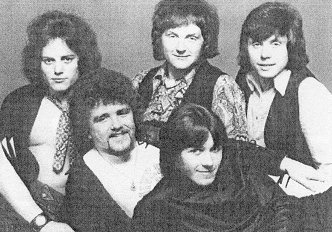
Montanas.
Seen here is the group line-up which recorded Let’s
Get A Little Sentimental with George Davies on the
left and a bearded Ian Lees. (Trevor Westwood) |
In 1967 Jake Elcock
joined the group from Finders Keepers and
Graham Hollis became the drummer. In 1969 the group
underwent a fundamental personnel change when Johnny
Jones and Terry Rowley joined the original five-piece
Trapeze.
The group drafted in Ian
'Sludge' Lees
and George Davies and continued to record with
Let’s Get A Little Sentimental and Uncle John’s
Band, two really good numbers. Both Johnny Jones and
Terry Rowley were to return to the group. The Montanas
officially ceased to be in about 1978. In 1997 a CD
called You've Got To Be Loved was released on
Sequel records. |
|
Mountain Kings
One of the local
groups who appeared on the Brumbeat LP released
by Decca in 1964.
They sang the
four tracks You Left Me Alone, Don't You Know,
There'll Be Times and Don't You Know?
Probably the
group's main local claim to fame is that the lead
guitarist was Terry Rowley who was to become
possibly the main ingredient in the success of the
Montanas.
|
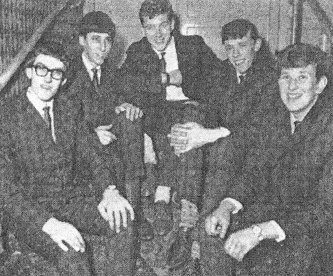
|
Mountain Kings.
One of the earlier local groups. They
participated on the Brumbeat album. Seen
second left is Terry Rowley. |
|
|
'N Betweens
The group would
ultimately become Ambrose Slade and then Slade
but they started their careers as the Vendors.
They became the 'N Betweens in 1964 with John Howells
as the lead singer, Mick Marson on rhythm, Don
Powell on drums and Dave Hill on lead. They
were later joined by Dave 'Cass' Jones on bass.
They were regarded by many as the local Rolling Stones
with their taste in music being somewhat different from
the normal beat group repertoire. They recorded a set of
four numbers for the French label Barclay in 1965.
|
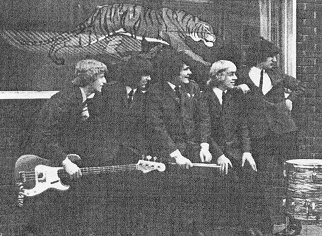
'N Betweens.The
early group is seen here posing outside the Tiger pub
which stood in North street in Wolverhampton. (John
Howells) |
Their lead singer was very highly
regarded. It was while they were in Germany that things
started to fall apart and it was not long after their
return that Jimmy Lea
replaced Dave Jones, Mick Marson and John Howells left
and Noddy Holder joined.
It was in 1966 that the version of
the 'N Betweens which was to become Slade began to play
together as a foursome because John Howells had joined
Blues Ensemble. They recorded
You Better Run. It was in 1969 that the group
became Ambrose Slade. The numbers released by the group
can be heard on the CD Genesis Of Slade. |
|
Nick & Axemen
Jimmy Lea's
first group. He played bass alongside Nick Vance
as lead singer with Rob Haynes and Barry
Wootton. While they achieved little as a group, they
will be remembered for spawning such an outstanding bass
player.
|
|
Our Generation
The group
emerged from Dean King & Conquests in 1965. They
were the first group with whom Anna Terrana (Lady
Jayne) sang.
The original
group included Phil Terrana and Kevin Bray.
They were to
become
Lady Jayne & Royaltee.
|
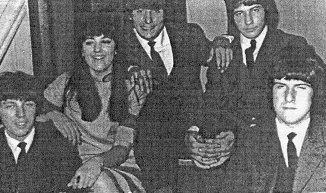
|
Our Generation.
The group which gave Anna Terrana her first
opportunity to sing. (Anna Terrana) |
|
|
Peasants
Won the
Spotlight On Youth competition in 1965. They were from
the Central Boys Club on Penn Road, the
club from which the Black Diamonds had
originated. The original group who won the contest split
up and the new line-up had Keith Charters on
vocals, Neville Chamberlain on lead, Chris Goy
on bass, John Stokes rhythm and Melvyn Marr
on drums.
Prim 'n' Proper
Originally
called Plus Five, they comprised Brian Eardley
on vocals, Mick Holland lead, Gary Lowbridge
bass, Peter Owen rhythm and Alan Dunn on
drums. They came second to the 'N Betweens when
they won the Staffordshire Group Championships. They
supported Manfred Mann in June 1966 at the Civic Hall.
Redcaps
Regarded by many
observers as the best of the early local beat groups.
They originated from Walsall. Their original
line-up was Ronnie King on vocals, Roy Brown
on lead guitar, the Walkers (Mick and
Dave) on bass and rhythm guitars, Malcolm
Broadhurst on sax and Jim Richards on drums.
In 1963 they released excellent versions of Shout
and Talkin' About You. Both numbers were in the
true tradition of early British Beat. They were managed
by Ma Regan and were regulars at her beat venues.
Mick Blythe joined the group from the Tremors
and wrote Funny Things, which they recorded in
1964. The vast majority of local group players from the
early 60s took the Redcaps as their model.
Ma Regan
One of the most
influential figures of the early beat scene in the area.
She managed many local groups, including the Redcaps,
but the thing she is most remembered for is the staging
of so many amazing shows at her set of venues, the
Plaza at Handsworth, the Ritz at King's Heath
and especially the Plaza at Old Hill. She managed
to get virtually every one of the major British beat
groups, including the Beatles, and many American
performers to play for her at some time during those
years. A lady who was truly a legend in her own
lifetime!
Revolver
The group
emerged in 1969 and was very highly regarded by all
those who saw them perform. They had Pete Mackie
on vocals, Geoff Parkes on lead, Alan Appleby
on bass, Chris Cooke and Chris Sparkes.
The group was managed by Nita Anderson. Both
Geoff Parkes and Pete Mackie joined Matthew later
in 1969. Other members of the group included Alistair
Benson and Dave Conway who wrote much of the
material for the group's Ten Commandments Of Love
album. Another example of a local group who deserved to
achieve far more commercial success. They released one
single called Frisco Annie.
Richelles
The group
originated in Tipton but at one time included Keith
Evans on drums. He became the drummer for the
Black Diamonds and for the Californians.
Another former drummer was Clive Simmonds who
later played for the Sounds Of Three. One of
their bass players was Trevor Woodall who played
with Tommy Burton.
|
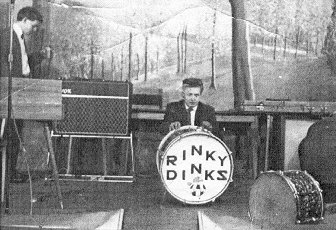
Rinky Dinks.
A group name which was popular throughout the country.
In the case of Wolverhampton, it was a group which
included at one time both Roger and Mick Deeming. Here
Mick can be seen trying to make sure the drums are in
the correct place. (Mick Deeming) |
Rinky Dinks
Originally known
as Roger & Dodgers. They changed their name while
working in France.
The group was to
change format with the late 1964 version including
Roger Deeming,
Graham Davies, Maurice Gallier and Dave
Towers.
They were one of
the first groups to become resident at the Merry Boys
on the Willenhall Road.
A later addition
to the group was the brother of the lead guitarist as
drummer, Mick Deeming.
|
|
Roger & Dodgers
One of the first
local groups to go abroad. They visited US bases in
France in 1963. The group realised that a girl singer
would prove beneficial with the American forces so they
arranged for a girl named Dinah Clunes to sing.
The group included Roger Deeming, Alan
Woolridge, Mike Pugh and Keith Evans.
It was while the group was in France that a name change
occurred and they became the Rinky Dinks.
|
 |
 |
 |
Return to
the
previous page |
Return to
the Contents |
Proceed to
the
next page |
|